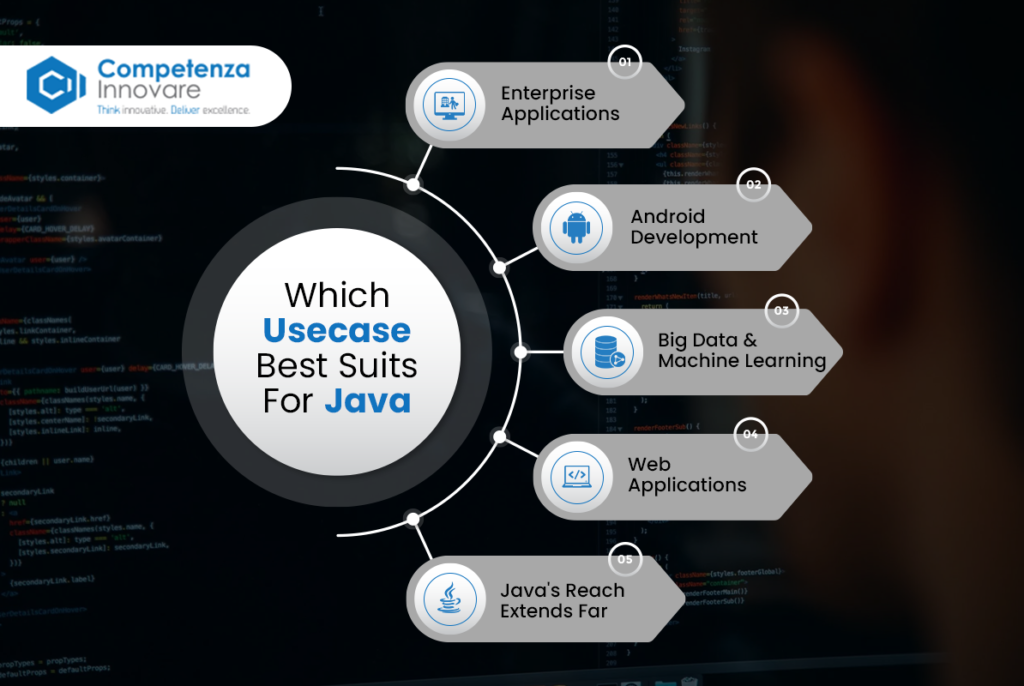Like many of others, do you have the same question “Which usecases best suits for java?”. If yes, then in this blog post we will resolve this query.
Java is a powerhouse in the programming world, renowned for its adaptability. As a general-purpose language, it can be used for the creation of a broad variety of applications rather than being stuck to one domain. Below are the three important features that will become the favorite of Java developers:
- Platform Independence: Once a java code is written then it can be virtually run on any machine which has Java Runtime Environment (JVM). There is no need to write it again for every platform!
- Object-Oriented Design: As objects are the foundation of Java, reusability is encouraged, maintainability, and logical program structure.
- Robust Ecosystem: Developer community of a large size and a variety of libraries and frameworks, Java has the feature to handle any developing task.
We will look at the particular scenarios in this blog post where Java succeeds, showcasing its benefits and the use cases where it excels.
Which Usecase Best Suits For Java:

Enterprise Applications:
Java is the most suitable language which is used for developing complicated, mission-critical applications. Here’s why:
- Scalability: Java programs can quickly grow to satisfy the needs of an organization. Due to its object-oriented nature, modular design is promoted which allows developers to easily add new features and functionality.
- Security: Java has been constructed with security as the primary concern. Features like sandboxing and strong type-checking make it naturally unaffected by flaws.
- Reliability: Enterprise applications demand stability. Java’s robust garbage collection and exception handling ensure smooth operation with minimal crashes. Stability is needed with enterprise applications Java’s powerful exception handling and garbage collection ensures uninterrupted operation with no crashes.
But Java doesn’t go it alone. Powerful frameworks like:
- Spring: By including pre-built components and a structured approach for building applications that will simplifies the development.
- Jakarta EE (formerly J2EE): A group of requirements for business functions like database access and web services which offers a uniform framework for building complicated applications.
These frameworks allow developers to keep their focus on core organization logic while Java handles the heavy lifting. The result? Secure, scalable, and reliable enterprise applications like:
- Banking Applications: As a result of its security ability, Java is suitable for building safe banking systems that will handle sensitive financial information.
- E-commerce Platforms: Java’s scalability allows accessible to e-commerce platforms to effectively handle a large amount of transactions and traffic.
- Enterprise Resource Planning (ERP) Systems: Java is ideal for developing complex ERP solutions that monitor a organization’s main operations due to its flexibility in interacting with various enterprise platforms.
Here are some real-time examples of enterprise applications built with Java:
- Banking: Java is the backbone of mission-critical systems for financial giants like:
- Chase Bank: Java is an essential part of their simple banking system infrastructure that provides stability and security.
- Citibank: Many of Citibank’s online banking and trading platforms are developed on Java frameworks.
- E-commerce: Major online retailers leverage Java’s scalability to handle massive traffic:
- eBay: Java plays a key role in eBay’s auction platform and seller tools. eBay’s seller tools and auction platforms depend on largely on Java.
- Amazon: While it makes use of a number of technologies, Java serves as a important component of Amazon’s backend infrastructure.
- ERP Systems: Leading ERP providers use Java for their core functionality:
- SAP: Java is utilized heavily in SAP’s ERP package, which ensures effective business resource management.
- Oracle: Oracle’s ERP offerings like Oracle E-Business Suite have a strong Java foundation. The oracle e business suite along with other ERP offerings are well founded on Java.
Android Development:
Java has been clearly the in charge in developing android applications for many years. Its dominance stemmed from several factors:
- Early Adopter: Java has been there since Android first launched, integrating with the SDK (Software Development Kit) without any issue and quickly becoming the language of choice for developing Android apps.
- Object-Oriented Fit: Development was established easily and efficiently with Java’s object-oriented design, that complimented Android’s basic components like Activities and Views.
While Kotlin, a more recent offering by Google, has emerged as a strong contender, Java’s position remains significant. Here’s why:
- Legacy Codebase: Java serves for developing nearly all applications of Android is now in use. This connects to an large supply of experienced Java developers and a variety of learning materials which has been designed with Java in the development of Android in mind.
- Still a Great Choice: Java’s readability, maintainability, and speed are its primary advantages , which makes it an ideal option for creating feature-rich and durable Android applications.
Java is still widely used in Android programming, despite the popularity of Kotlin. Java’s continuing relevance for Android applications is ensured by its established codebase, large developer pool, and wealth of instructional materials.
Big Data and Machine Learning:
Big data that can be defined by huge and complex datasets, that can seem to be quit distinct from Java’s normal business foundations. But here’s the surprise: Java excels in handling these challenges tool! Java used to build AI & ML platforms.
- Built for Scalability: Scalability is provided as the greatest importance in Java’s essential architecture. It is perfect for big data operations due to its capacity to handle enormous datasets which are distributed over various devices in an effective manner.
- Performance Prowess: Big data calculations requires Java’s Just-In-Time (JIT) compilation, that converts software into machine specific commands for fast performance.
To unleash Java’s power in big data, developers leverage frameworks like:
- Apache Spark: This well-liked framework makes utilization of of Java’s capabilities to provide rapid and efficient data processing, both scattered across clusters and in memory. It’s a game-changer for big data analytics.
- H2O: Another Java-based powerhouse, Utilizing huge data for creating machine learning models becomes easier with H2O. For procedures like gathering of data, building models, and deployment, it provides a user-friendly interface.
Though these frameworks execute the majority of work, Java performs a further part. Weeks and along with other machine learning libraries has been entirely developed in Java and offer an extensive variety of methods for data mining, grouping and various other purposes. This allows developers to leverage Java’s familiarity and vast ecosystem for complex machine learning tasks.
Web Applications:
Java isn’t just for building desktop applications – it’s a rockstar in the world of web development too! But here’s the twist: Java primarily thrives on the server-side of web applications.
Consider a web application like a restaurant. The elegant menu that the waiter presents to you is User Interface (UI) which you are interacting with. But the true magic occurs in the kitchen where your order (user request) tells the chefs (server-side code) how they should prepare the food (process data and generate responses). This kitchen, the heart of the operation, is often powered by Java.
- Robust Server-Side Development: Java is quite good at handling complex server-side business logic. It can interact with databases, manage user requests quickly, and offer dynamic content for sites.
- Scalability for High Traffic: Java web applications are capable of handling a large number of users with ease. For popular websites with millions of visits, this makes it ideal.
While Java handles the server-side magic, frameworks like:
- Struts: Make the process of creating web applications more structured, which makes overall development and maintenance easier.
- JavaServer Faces (JSF): Causes web development more easier to understand by offering a component-based approach for building user interfaces.
These frameworks streamline the process of building web applications on the Java platform.
And the results speak for themselves! Popular websites like:
- Netflix: Java’s server-side capabilities are essential for the recommendation engine and content delivery system that run for your marathon watching sessions.
- LinkedIn: Java is utilized in the backend of the professional networking site to effectively manage interactions, job ads and profiles.
So, next time you browse your favorite website, remember the silent powerhouse behind the scenes – Java, orchestrating the magic from the server side.
Other Interesting Use Cases: Java’s Reach Extends Far
The benefit of Java goes beyond the fundamental topics that we have discussed. Here’s a glimpse into some other fascinating use cases:
- Desktop Applications: Java is not only for mobile and web. Java is utilized in the development of popular IDEs (Integrated Development Environments) like Eclipse and IntelliJ IDEA, which provides developers with access to strong tools.
- Embedded Systems: Java is appropriate for embedded systems because it can run on limited hardware. It can be found in medical equipment, smart home products, and industrial automation equipment.
- Scientific Computing: Scientific libraries like Java Numerical Math Library (JNA) and Apache Commons Math are common in the Java environment. These libraries offer Java powerful tools for simulations and calculations associated with science.
Conclusion:
It’s amazing how Java has grown from a general-purpose language to a complex expertise. We’ve explored its strengths in crafting:
- Secure and scalable enterprise apps
- Feature-rich Android apps
- Powerful big data and machine learning solutions
- Robust server-side logic for web applications
However, Java’s potential goes far beyond that. Its application is truly amazing, spanning from scientific computers to embedded systems and desktop applications.
Choosing Java for your project? Consider these factors:
- Project complexity: Java excels at handling large-scale applications.
- Developer expertise: A skilled Java team can leverage its vast ecosystem effectively.
- Performance needs: Java offers good performance, but for highly specialized tasks, other languages might be better suited.
Intrigued by Java’s potential? Go further! Examine the wealth of online resources, tutorials, and frameworks that are readily available. The prospects for developing creative apps are endless if you have Java on your side!




